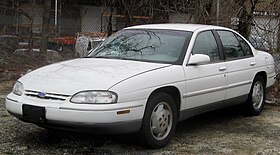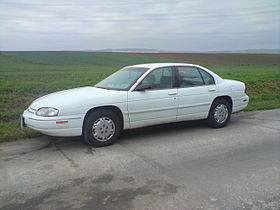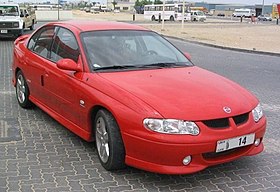Chevrolet Lumina
This article has multiple issues. Please help improve it or discuss these issues on the talk page. (Learn how and when to remove these messages)
|
| Chevrolet Lumina | |
|---|---|
 | |
| Overview | |
| Manufacturer | Chevrolet (General Motors) |
| Production | 1989–2001 1998-1999 (Mexico) |
| Body and chassis | |
| Class | Mid-size |
| Layout | Transverse front-engine, front-wheel drive |
| Platform | W-body |
| Related | Chevrolet Monte Carlo Oldsmobile Cutlass Supreme Pontiac Grand Prix |
| Chronology | |
| Predecessor | Chevrolet Celebrity (sedan) Chevrolet Monte Carlo (coupe) Chevrolet Caprice (Mexico) |
| Successor | Chevrolet Impala (sedan) Chevrolet Monte Carlo (coupe) Chevrolet Caprice (Mexico) |
The Chevrolet Lumina is a name used on many vehicles produced by Chevrolet. First introduced for the 1990 model year, Chevrolet used the name on a sedan, a coupé, and a minivan.[1] The sedan replaced the Chevrolet Celebrity, the coupé replaced the Monte Carlo, and the minivan was both a replacement for the Celebrity station wagon and a completely new vehicle. In 1995, the Lumina Coupé was replaced by the Monte Carlo.[2] In 1997, the Chevrolet Lumina APV was replaced by the Chevrolet Venture.[3] In 2000, the Lumina Sedan was replaced by the Impala.[1]
The third and fourth generation was manufactured in Australia by GM-owned Holden, for export mainly to the Middle East and South Africa between 1998 and 2013.[4]
First generation (1989–1994)
| First Generation | |
|---|---|
 1991-1994 Chevrolet Lumina Sedan | |
| Overview | |
| Also called | Chevrolet Z34 |
| Production | January 1989–August 25, 1994[5] |
| Model years | 1990–1994 |
| Assembly | Oshawa, Ontario, Canada |
| Body and chassis | |
| Body style | 2-door coupe 4-door sedan |
| Layout | FF layout |
| Platform | W-body |
| Related | Buick Regal Oldsmobile Cutlass Supreme Pontiac Grand Prix |
| Powertrain | |
| Engine | 2.2 L 122 I4 2.5 L Iron Duke I4 3.1 L LH0 V6 3.4 L LQ1 V6 |
| Transmission | 5-speed manual 3-speed 3T40 automatic 4-speed 4T60 automatic 4-speed 4T60-E automatic |
| Dimensions | |
| Wheelbase | 107.5 in (2,730 mm) |
| Length | 1990 Coupe: 198.4 in (5,039 mm) 1990 Sedan: 197.6 in (5,019 mm) 1991–94 Coupe & 1993–94 Sedan: 198.3 in (5,037 mm) 1991–92 Sedan & Z34 Sedan: 199.3 in (5,062 mm) |
| Width | Coupe & Z34 Sedan: 71.7 in (1,821 mm) Sedan: 71.0 in (1,803 mm) |
| Height | Coupe & Z34 Sedan: 53.3 in (1,354 mm) Sedan: 53.6 in (1,361 mm) |
| Curb weight | 3496 lb (1586 kg) |

The North American Chevrolet Lumina was based on the mid-size GM W platform, which was shared with the Pontiac Grand Prix, Oldsmobile Cutlass Supreme (later Intrigue), Buick Regal and Buick Century (after 1996).[6] Although the Lumina became a popular seller, GM was widely criticized in the motoring press for being late to the game in introducing a direct aero-designed competitor to the Ford Taurus.[7] Ironically, the "Lumina" name was considered by Ford in the pre-production stage of the Taurus.[8] The Chevrolet Lumina's first generation ended production in August 1994, making this the shortest-lived generation of the first-generation GM W-body cars.[9]
In 1989, the Lumina became the nameplate under which Chevrolets were raced in NASCAR, more than a year before the model was available to the public.[10]
Chevrolet Lumina Sign Deal With Disney-MGM Studios to Official Car.[11]
Specifications
- Front Head Room 39.9 in.
- Front Hip Room 51.9 in.
- Front Shoulder 59.9 in.
- Front Leg 49.9 in.
- Fuel Tank 16.5 gallons
Engines
- 1990–1992 2.5 L (151 in³) Iron Duke I4
- 1993–1994 2.2 L (134 in³) 122 I4
- 1990–1994 3.1 L (191 in³) LHO V6
- 1991–1994 3.4 L DOHC (207 in³) LQ1 V6
Lumina Z34

Starting in 1990, Chevrolet offered a high performance version of the Lumina, the Lumina Z34. In order to enhance its performance it came standard with the FE3 sport suspension package, the 210 hp LQ1 V6 engine shared with the Lumina Euro 3.4 (sedan), the five speed Getrag 284 manual transmission, dual exhaust and four-wheel anti-lock brakes. The Z34 also featured cosmetic changes to go along with the performance enhancements such as unique front and rear fascias, side skirts, a rear spoiler, a louvered hood, a unique steering wheel and sport bucket seats. Performance figures were quite impressive for a front wheel drive V6 engine powered car, with a 0-60 mph (0–97 km/h) time of 7.5 seconds, a 1/4 mile (~400 m) time of 15.5 seconds, a (limited) top speed of 130 mph (209.21 km/h), a 60-0 mph (97–0 km/h) distance of in 153 ft (47 m), and a lateral acceleration of 0.79 g's (7.7 m/s²). A Bose stereo system and automatic transmission, which lowered the horsepower rating to 200 and 0-60 time by a .5 seconds, were optional. The only paint colors available for the Z34 were white, red, black, gray, silver, and light blue. In 1995, the Lumina Z34 was replaced with the Chevrolet Monte Carlo Z34.
Production
| Year | Total Sedans | Total Coupes | Sedan LQ1 | Coupe LQ1 |
|---|---|---|---|---|
| 1990 | 278,311 | 45,783 | N/A | N/A |
| 1991 | 157,782 | 34,495 | N/A | 8,936 |
| 1992 | 188,557 | 33,490 | 5,623 | 13,016 |
| 1993 | 200,842 | 29,916 | 3,489 | 12,323 |
| 1994 | 75,753 | 10,866 | 1,234 | 4,478 |
| Total production[12] | 901,245 | 154,550 |
Safety

| 1989 | Frontal Driver | Frontal Passenger | Side Driver | Side Passenger | 4x2 Rollover | 4x4 Rollover |
|---|---|---|---|---|---|---|
| 1990 | Not Rated | Not Rated | Not Rated | Not Rated | Not Rated | |
| 1991 | Not Rated | Not Rated | Not Rated | Not Rated | Not Rated | |
| 1992 | Not Rated | Not Rated | Not Rated | Not Rated | Not Rated | |
| 1993 | Not Rated | Not Rated | Not Rated | Not Rated | Not Rated | |
| 1994 | Not Rated | Not Rated | Not Rated | Not Rated | Not Rated |
Second generation (1994–2001)
| Second Generation: | |
|---|---|
 | |
| Overview | |
| Production | March 7, 1994–April 26, 2001[5][18][19] |
| Assembly | Ramos Arizpe, Mexico Oshawa, Ontario, Canada |
| Designer | Chuck Jordan (1990, 1991) |
| Body and chassis | |
| Body style | 4-door sedan |
| Layout | FF layout |
| Platform | W-body 1.5 Gen |
| Related | Chevrolet Monte Carlo Oldsmobile Cutlass Supreme Pontiac Grand Prix |
| Powertrain | |
| Engine | 3.1 L L82 V6 3.1 L LG8 V6 3.4 L LQ1 V6 3.8 L L36 V6 |
| Transmission | 4-speed 4T60-E automatic 4-speed 4T65-E automatic |
| Dimensions | |
| Length | 200.9 in (5,103 mm) |
| Width | 72.5 in (1,842 mm) |
| Height | 1995–98: 55.2 in (1,402 mm) 1999–2001: 54.8 in (1,392 mm) |
| Chronology | |
| Successor | Chevrolet Caprice (in Mexico) Chevrolet Impala (in Spain) |
General Motors began development of an updated Lumina in 1989, under chief engineer Norm Sholler, planned for a late 1992 launch. By 1991, a final body design was approved. Development eventually took longer than planned, delaying launch by 18 months. The redesigned Lumina was unveiled at 1995 Los Angeles Auto Show in January 1994 as a 1995 model. The 1995 Lumina had received a rounded body, increasing its size and an updated interior. Unlike its other W platform counterparts, the Lumina retained the first-generation chassis. Replacing the Lumina two-door was a resurrected Monte Carlo. The LH0 V6 was dropped in favor of the L82 V6, known as the 3100 SFI; the latter engine produced 20 more horsepower from the same displacement thanks to a revised intake manifold and cylinder heads.[20][21][22][23]
Initial trim levels consisted of base and LS; the latter replacing the "Euro" trim. Options included an electric sunroof, leather bucket seats, power windows, power driver seat, and an AM/FM stereo with CD player. This Lumina was also sold with police (code 9C3) and taxi packages, due to the Chevrolet Caprice being discontinued after the 1996 model year. (1998 in Mexico) Production began on Monte Carlo coupes in February 1994 and March 7, 1994 for Lumina sedans at GM's Oshawa manufacturing plant, for a June 6, 1994 market launch for the latter model.[24]
The LTZ trim was introduced in 1996 for the 1997 model year to soften the blow from the discontinued Impala SS and Caprice. Its standard features included 16" brushed aluminum wheels, blackwall radial sport tires, sport tuned suspension, a 3.1 L V6 rated at 160 hp (120 kW) and 185 lb⋅ft (251 N⋅m) or an optional 3.4 L V6 rated at 215 hp (160 kW) and 220 lb⋅ft (300 N⋅m) of torque, a rear spoiler, restyled front and rear body clips (resembling the Monte Carlo Z34), a tachometer, and a floor-mounted shifter.
In 1997 for MY 1998, the 3.4 L V6 was replaced by the 3800 Series II which made 200 hp (150 kW) and 225 lb⋅ft (305 N⋅m) torque. Despite its increased torque, the 3.8 liter LTZ demonstrated slightly worse performance due to its lowered horsepower, with 0-60 mph (0–100 km/h) times of 7.5 seconds (as opposed to 7.2 for the LQ1) and 1/4 mile (~400 m) times of 15.7 seconds (as opposed to 15.5 for the LQ1). The car has a computer-limited top speed of 107 mph (172 km/h) and the rev limiter kicks in at 5800 rpm for the 3.8L (Rev limiter is at 7000 rpm for the 3.4L LQ1).
Also in 1997, the 1998 model year Luminas received second generation airbags. The front-wheel drive Chevrolet Impala was introduced as a replacement for the Lumina in 1999, although GM did produce 2001 model year Luminas to be exclusively sold for rental fleets. Retail sales of the Lumina ended in Canada in 1999, with the United States following suit a year later. Fleet production ended on April 26, 2001. In some Asian countries, the Lumina continued as a rebadged Buick Century/Regal.

Specification levels
Throughout its lifecycle, the second generation Lumina was available in three trim levels:
Base (1995–2001): The most popular Lumina, the base model came well equipped for its price point. It had standard front row bench seat which upped seating to six, power locks, tilt steering wheel, dual airbags, and air conditioning. Base models were equipped with fifteen-inch steel wheels with wheel covers.
LS (1995–1999): Second highest trim level, LS models offered aluminum wheels, optional dual zone temperature controls, power windows (optional on Base), tachometer, higher-end stereo with GM's Delcolock, anti-lock brakes, remote keyless entry system, upgraded seats, and an optional 3.4 L DOHC engine (1995-1997) or 3.8 L 3800 V6 (1998-1999).
LTZ (1997–1999): The top of the line Lumina which included alloy wheels, a choice of the 3.1 L V6 engine, 3.4L DOHC engine or 3.8 L V6 engine (1998-1999 only), power driver seat, dual zone climate control and leather with the option for deluxe cloth. A center console was standard on LTZ (optional on LS). To differentiate itself aesthetically from the lesser models, it received the front end, trunk lid and taillights from the Fifth Generation Chevrolet Monte Carlo.
Engines
- 1995–1999 3.1 L (191 in³) L82 V6
- 1995–1997 3.4 L DOHC(207 in³) LQ1 V6
- 1998–1999 3.8 L (231 in³) L36 V6
- 2000–2001 3.1 L (191 in³) LG8 V6
Production
| Year | Total Units | LQ1 | L36 |
|---|---|---|---|
| 1995 | 264,688 | 15,998 | N/A |
| 1996 | 224,553 | 2,054 | N/A |
| 1997 | 234,626 | 7 | N/A |
| 1998 | 208,627 | N/A | 16,679 |
| 1999 | 139,098 | N/A | 13,869 |
| 2000 | 37,493 | N/A | N/A |
| 2001 | 42,803 | N/A | N/A |
| Total production | 1,151,888 |
Safety
Insurance Institute for Highway Safety (IIHS)
| Moderate overlap frontal offset | Good |
| Small overlap frontal offset | Not Tested |
| Side impact | Not Tested |
| Roof strength | Not Tested |
NHTSA
| Year | Frontal Driver | Frontal Passenger | Side Driver | Side Passenger | 4x2 Rollover | 4x4 Rollover |
|---|---|---|---|---|---|---|
| 1995 | Not Rated | Not Rated | Not Rated | Not Rated | ||
| 1996 | Not Rated | Not Rated | Not Rated | Not Rated | ||
| 1997 | Not Rated | Not Rated | ||||
| 1998 | Not Rated | Not Rated | ||||
| 1999 | Not Rated | Not Rated | ||||
| 2000 | Not Rated | Not Rated | ||||
| 2001 | Not Rated |
Third & fourth generation (1998 - 2013)
| Third & Fourth Generation: | |
|---|---|
 2000–2001 Chevrolet Lumina SS sedan (third generation) | |
| Overview | |
| Production | 1998 to 2013 |
| Assembly | Elizabeth, South Australia |
| Body and chassis | |
| Body style | 4-door sedan |
| Layout | FR layout |
| Platform | GM V platform (1978–2006) GM Zeta platform (2006–2013) |
| Related | Holden Commodore, Chevrolet Omega, Pontiac G8 |
The Australian GM subsidiary, Holden, manufactured a third and fourth generation Lumina based on the rear-wheel drive Commodore (VX, VZ and VE series) sedan, sport utility and coupé (the latter body not available with the fourth generation VE series).
This model was exclusively manufactured for export primarily to the Middle East and South Africa. Luxury specifications of these sedans were also exported in Brazil as the Chevrolet Omega.
High-performance models were powered by Chevrolet V8 engines, including the high specification Pontiac G8 based on the VE Series, exported to the United States.
References
- ^ a b Network, Automotive.com - TEN: The Enthusiast. "Chevrolet Lumina - Research New & Used Chevy Lumina Sedans | Automotive.com". Automotive.com. Retrieved 2016-01-29.
- ^ "Chevrolet montecarlo model history". NADAguides. Retrieved 2016-01-29.
- ^ "Chevrolet Venture model history". NADAguides. Retrieved 2016-01-29.
- ^ Nunez, Alex. "Chevrolet Special Vehicles debuts in Middle East with the CR8". Autoblog. Retrieved 2016-01-29.
- ^ a b http://www.autonews.com/article/20010430/ANA/104300757/lumina-reaches-end-of-the-line
- ^ "Curbside Classic: 1990-94 Chevrolet Lumina – Not Quite Saving The Best 'Til Last". Curbside Classic. Retrieved 2016-01-29.
- ^ Krebs, Michelle (1996-06-23). "BEHIND THE WHEEL/Ford Taurus G vs. Chevrolet Lumina;Some Cheap Shots In the Price Fight". The New York Times. ISSN 0362-4331. Retrieved 2016-01-29.
- ^ Snitkoff, Edward. "Curbside Classic: 1986 Ford Taurus/Mercury Sable – At This Moment, You Mean Everything". Curbside Classics. Retrieved 19 October 2015.
- ^ "New Chevrolet Lumina | New car models". www.thenewautos.net. Retrieved 2016-01-29.
- ^ "Lumina To Make Its Nascar Finale". tribunedigital-dailypress. Retrieved 2016-01-29.
- ^ http://jalopnik.com/5980334/the-1990-chevrolet-lumina-is-the-official-car-of-disney-mgm-studios
- ^ The Encyclopedia of American Cars, 2006 Edition
- ^ "1990 Chevrolet Lumina 4-DR. | Safercar - NHTSA". Safercar.gov. Retrieved 2013-04-05.
- ^ "1991 Chevrolet Lumina 4-DR. | Safercar - NHTSA". Safercar.gov. Retrieved 2013-04-05.
- ^ "1992 Chevrolet Lumina 4-DR. | Safercar - NHTSA". Safercar.gov. Retrieved 2013-04-05.
- ^ "1993 Chevrolet Lumina 4-DR. | Safercar - NHTSA". Safercar.gov. Retrieved 2013-04-05.
- ^ "1994 Chevrolet Lumina 4-DR. | Safercar - NHTSA". Safercar.gov. Retrieved 2013-04-05.
- ^ http://newjerseyhills.newspapers.com/newspage/95535345/
- ^ https://www.gmheritagecenter.com/docs/gm-heritage-archive/vehicle-information-kits/Lumina/1995-Chevrolet-Lumina.pdf
- ^ http://articles.chicagotribune.com/1993-02-07/business/9303176480_1_chrysler-concorde-sedans-model-years
- ^ http://articles.chicagotribune.com/1993-06-06/travel/9306060421_1_gm-general-motors-corp-designs
- ^ autosofinterest.com/2014/01/05/design-notes-1995-chevrolet-lumina-sedan/2/
- ^ http://articles.latimes.com/1994-01-13/news/vw-11485_1_city-car
- ^ http://www.autonews.com/article/19940221/ANA/402210747/chevrolet-rolls-out-its-comeback-cars-:monte-carlo-lumina-lead-mid
- ^ "IIHS-HLDI: Chevrolet Lumina". Iihs.org. Retrieved 2013-04-04.
- ^ "1995 Chevrolet Lumina 4-DR. | Safercar - NHTSA". Safercar.gov. Retrieved 2013-04-05.
- ^ "1996 Chevrolet Lumina 4-DR. | Safercar - NHTSA". Safercar.gov. Retrieved 2013-04-05.
- ^ "1997 Chevrolet Lumina 4-DR. | Safercar - NHTSA". Safercar.gov. Retrieved 2013-04-05.
- ^ "1998 Chevrolet Lumina 4-DR. | Safercar - NHTSA". Safercar.gov. Retrieved 2013-04-05.
- ^ "1999 Chevrolet Lumina 4-DR. | Safercar - NHTSA". Safercar.gov. Retrieved 2013-04-05.
- ^ "2000 Chevrolet Lumina 4-DR. | Safercar - NHTSA". Safercar.gov. Retrieved 2013-04-05.
- ^ "2001 Chevrolet Lumina 4-DR. | Safercar - NHTSA". Safercar.gov. Retrieved 2013-04-05.
